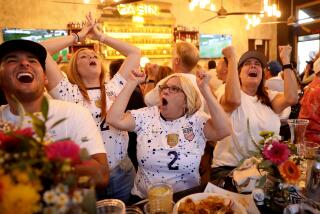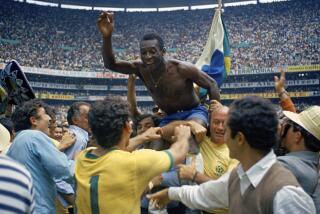Gigantic Guga
- Share via
NEW YORK — The year is 2001, not 1994. The sport is tennis, not soccer. Yet there they are again, those yellow Brazilian jerseys in the stands, dotting stadiums around the world, doting upon the newest sporting superstar with only one name required, Guga.
Nearly 25 years ago, he was born Gustavo Kuerten in Florianopolis, Brazil, where he grew up polishing a one-handed backhand every bit as devastating as soccer star Rivaldo’s left foot. He is No. 1 in Brazil, No. 1 in the world and his nickname, Guga, is a veritable bit of Esperanto, instantly recognizable from one hemisphere to the other.
On a recent Southern California evening, on an ocean-side bike path, a jogger was wearing a yellow and blue shirt from the 1994 World Cup of soccer bearing the words, “WELCOME Brasil.” A cyclist whizzed past and peeled back, smiling, hopeful: “Are you from Brazil?”
The cyclist, Eduardo, recovered quickly from his disappointment at not finding another Brazilian friend to hang with during his three-year self-imposed exile at a local computer company. He said he has little interest in Brazilian soccer or tennis, only cycling, but the mention of Guga brought an immediate smile and response:
“Now that Senna is gone, he is No. 1.”
More important, Eduardo explained, is that Kuerten has stayed humble after reaching No. 1 in Brazil, and then in the world of tennis. The 1994 death of auto racer Ayrton Senna and the career demise of soccer star Ronaldo and soap-opera type failings of the Brazilian national soccer team have lifted the 24-year-old Kuerten past star status into deity territory.
This is illustrated by a popular cartoon of Kuerten that recently appeared in a Brazilian newspaper. He is pictured as a teacher standing in front of a chalkboard, lecturing a remedial class about the fundamentals of winning, pointing to simple drawings of a soccer ball and goal. His students are yellow-shirted members of the Brazilian national soccer team, which is struggling to qualify for next year’s World Cup. Such a characterization would have been unthinkable a couple of years ago. But what-have-you-done-for-us-lately is a universal concept and in Brazil, Kuerten has become a source of national pride whereas the once-peerless soccer team has become the butt of jokes.
That is a remarkable turn of fortunes considering that Brazil won the World Cup in the United States in 1994 and finished as runner-up in France in ’98.
“It is as tough as being the president of Brazil as being the head coach of the national team,” Kuerten said.
Brazilians can rely on the delightful contradiction of Kuerten. He may have the appeal of a laid-back surfer with musical aspirations, but he has won the most grueling of the Grand Slams, the French Open, three times. He succeeds on an international stage with a style distinctly Brazilian.
Days after his elimination at the Sydney Olympics, Kuerten could be seen with friends at Bondi Beach, singing and dancing in the stands for the entire beach volleyball gold-medal match between the United States and Brazil.
The public sees Kuerten as something of a tennis bohemian, a romantic soul who took his racket and scrawled a heart into the Roland Garros clay after surviving match point in the fourth round against qualifier Michael Russell. During matches, fans chant his nickname in sing-song, almost childlike, rhythms: “Gu-ga! Gu-ga!”
They warm to the details of his life story: A father who died of a heart attack while umpiring a junior match when Kuerten was 9, a younger brother who is handicapped and receives Kuerten’s tennis trophies.
Kuerten takes his brother around Florianopolis with him, making sure he is not left at home during social occasions.
For these reasons, Kuerten is virtually Mr. Teflon in Brazil--and points elsewhere. He dislikes playing on grass and skipped Wimbledon this year--the reigning French Open champion and world No. 1 ignoring tennis’ most prestigious event. Kuerten said he was injured and could have played if he “had a third leg.” Still, his snub went almost unnoticed by the media.
“The press, it’s a very powerful force,” Kuerten said. “Ninety percent of the people in Brazil don’t know me. They know me as they read or as they look in the TV. They don’t know me personally to see how I really am.”
That is by design. He maintains careful control over his image. He has had the same coach since 1989, Larri Passos, and kept him even when pressured to make a change for the sake of change. Passos is more like a father figure and Kuerten paid tribute to him after he won recently at Cincinnati, calling him one of his “four fathers.”
Kuerten rarely grants one-on-one interviews. A 20-minute session for this story was more difficult to arrange than most diplomatic missions.
He agreed to be interviewed in a small room next to the dressing area at last month’s tournament at UCLA. The jet-lagged Kuerten--who days earlier won a clay-court event in Stuttgart, Germany--was doing his best to accommodate.
First, he did a television spot. The crew wanted him to take off his ever-present baseball cap. Though Kuerten is poetic and soulful, he is a realist, and refused to remove the sponsor-laden hat.
Later, the tape ran out and the crew asked if Kuerten could wait while a new tape was loaded. He was not pleased. His body clock was still on German time. He looked like he needed a pillow.
Once taping resumed, Kuerten was asked what he would do if he were Mark Miles, chief executive of the ATP.
“I don’t want to be Mark Miles,” he said.
A moment later, he had an idea.
“One thing,” Kuerten suggested, “would be to play more tennis in Brazil. In America, they have enough.”
The TV crew moved on and Kuerten looked happier. One more interview and he could get back to sleep.
Along with surfing, music is a passion. He plays guitar, but unlike tennis, he does not play it particularly well. So, on this trip, the racket made it to America but the guitar stayed home.
“I’ve been playing one year,” he said. “This time, I didn’t bring it because I want to buy the bass here.”
With his other instrument, Kuerten reached the semifinals at the UCLA event, losing to Andre Agassi in three sets. Later in the summer, he split two meetings with Andy Roddick, winning the second match on his way to the title at Cincinnati. A rib cage injury at Indianapolis forced him to retire in the final against Patrick Rafter.
His representatives reported that the injury had improved and Kuerten was scheduled to resume practice Thursday.
He is seeking to improve his Grand Slam credentials outside France--here, at the U.S. Open, where he never has had a better opportunity. Unlike most years, no player has dominated the hard-court circuit in the U.S.
Kuerten’s best performance in a Grand Slam other than the French was in reaching quarterfinals at Wimbledon and the U.S. Open in 1999.
In 2001, Kuerten lost early, in the second round to Greg Rusedski, at the Australian Open, and will come into the U.S. Open, which starts Monday, trying to escape the bitter memory of losing in the first round here last year. He will play Daniel Vacek of the Czech Republic in the first round and is on track to meet Yevgeny Kafelnikov in the quarterfinals.
And, like always, a country is monitoring his every stroke.
“People in Brazil are so happy, more happy than me when I win,” he said. “Yes, everybody feels more proud, and happy and everything. And when they are frustrated, people throwing the TV remote around. It’s a good connection whether [my tennis is] good or bad.”
(BEGIN TEXT OF INFOBOX / INFOGRAPHIC)
U.S. Open
When: Monday-Sept. 9
Where: National Tennis Center, New York
TV: Daily coverage on USA network (Monday through Sept. 6 and on Sept. 9) and on Channel 2 (Sept. 1-3 and Sept. 7-9).
Grand Slam Record
Gustavo Kuerten’s record in Grand Slam tournaments, with the last round reached:
1996
French Open 1st
*
1997
Australian Open 2nd
French Open Won
Wimbledon1st
U.S. Open 3rd
*
1998
Australian Open 2nd
French Open 2nd
Wimbledon 1st
U.S. Open 2nd
*
1999
Australian Open 2nd
French Open Quarterfinals
Wimbledon Quarterfinals
U.S. Open Quarterfinals
*
2000
Australian Open 1st
French Open Won
Wimbledon 3rd
U.S. Open 1st
*
2001
Australian Open 2nd
French Open Won
Wimbledon DNP
*
Career match records:
Australian Open 4-5
French Open 26-3
Wimbledon 6-4
U.S. Open 7-4
More to Read
Go beyond the scoreboard
Get the latest on L.A.'s teams in the daily Sports Report newsletter.
You may occasionally receive promotional content from the Los Angeles Times.








